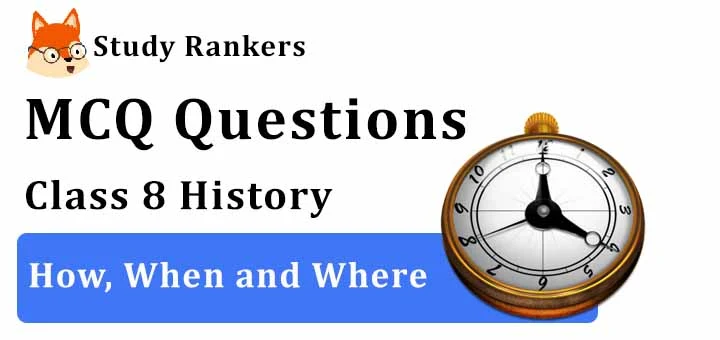MCQ Questions for Class 8 History: Ch 1 How, When and Where

1. From a layman's point of view, which one of the following option is synonymous with the study of History and very difficult to memorise?
(a) Dates
(b) Census
(c) Surveys
(d) Artefacts
► (a) Dates
2. When did Tipu Sultan became the ruler of Mysore?
(a) 1781
(b) 1780
(c) 1779
(d) 1782
► (d) 1782
3. The chosen set of dates by the Historians become more vital when the focus is on a
(a) Particular set of events
(b) Particular Location
(c) Particular Battle
(d) Particular King
► (a) Particular set of events
4. History is considered to be a study of _____________.
(a) Comparisons
(b) The Present
(c) The Past
(d) The Future
► (c) The Past
5. What is Imperialism?
(a) Imperialism is a political system
(b) Imperialism is a technical term
(c) Imperialism is a traditional system
(d) None of these
► (a) Imperialism is a political system
6. What are the sources of information of the periods?
(a) Primary sources
(b) Secondary sources
(c) Both a and b
(d) None of these
► (c) Both a and b
7. James Mill was of the opinion that before British came to India, __________ruled the country.
(a) Hindus and Muslims
(b) Only Hindus
(c) Hindus, Muslims and Christians
(d) Only Muslims
► (a) Hindus and Muslims
8. Given below are some reasons to study History in the present world. Select the one that is not applicable to the study of history
(a) Since future is moulded on the basis of past events, it is important to study History.
(b) History is a record of people, places, events of the present arranged in chronological order.
(c) History is all about finding out how things have changed over a period of time.
(d) History is a catalogue of events, to understand about people, their customs, traditions etc.
► (b) History is a record of people, places, events of the present arranged in chronological order.
9. A list of historical events is given below. Choose the one where a precise date can be fixed.
(a) Start of Mughal Rule in India
(b) Start of British rule in India
(c) Assassination of Mahatma Gandhi
(d) Start of Non- cooperation Movement
► (c) Assassination of Mahatma Gandhi
10. Name the three volume work of James Mill, the Scottish economist and philosopher.
(a) Glimpses of India
(b) History of British India
(c) An ancient History of India
(d) Glimpses of British History
► (b) History of British India
11. Historians often compared Past with the Present and always referred to _________. i.e. Before and After.
(a) Event
(b) Time
(c) Period
(d) Phase
► (b) Time
12. What was the important suggestion made by James Mill to the British?
(a) British should conquer all the territories in India to ensure the enlightenment and happiness of Indian People
(b) Introduction of European manners and Western education will lower the level of Indian civilization
(c) With Religious tolerance, caste taboos and other superstitious practices only India can progress.
(d) India will progress without British help.
► (a) British should conquer all the territories in India to ensure the enlightenment and happiness of Indian People
13. Historians believed that Time does not have _________ dates in terms of a particular year or month
(a) Abstruse
(b) Precise
(c) Ambiguous
(d) Imprecise
► (b) Precise
14. Pick out the statement that does not justify the significance of a timeline in History.
(a) A time line helps to identify the chronological occurrence of an event in a planned and arranged manner
(b) A timeline helps to keep information according to the sequence of events
(c) A timeline is not a graphical interpretation
(d) A timeline is organized according to the dates
► (c) A timeline is not a graphical interpretation
15. History is about finding out how things were in the past and how things have ________
(a) Changed
(b) Started
(c) Ended/completed
(d) Evolved
► (a) Changed
16. When Historians write History, they divide it into different chapters. Why ?
(a) To give a neat look and presentation
(b) To give each chapter some coherence
(c) For easier selection of dates.
(d) To associate the events separately
► (b) To give each chapter some coherence

